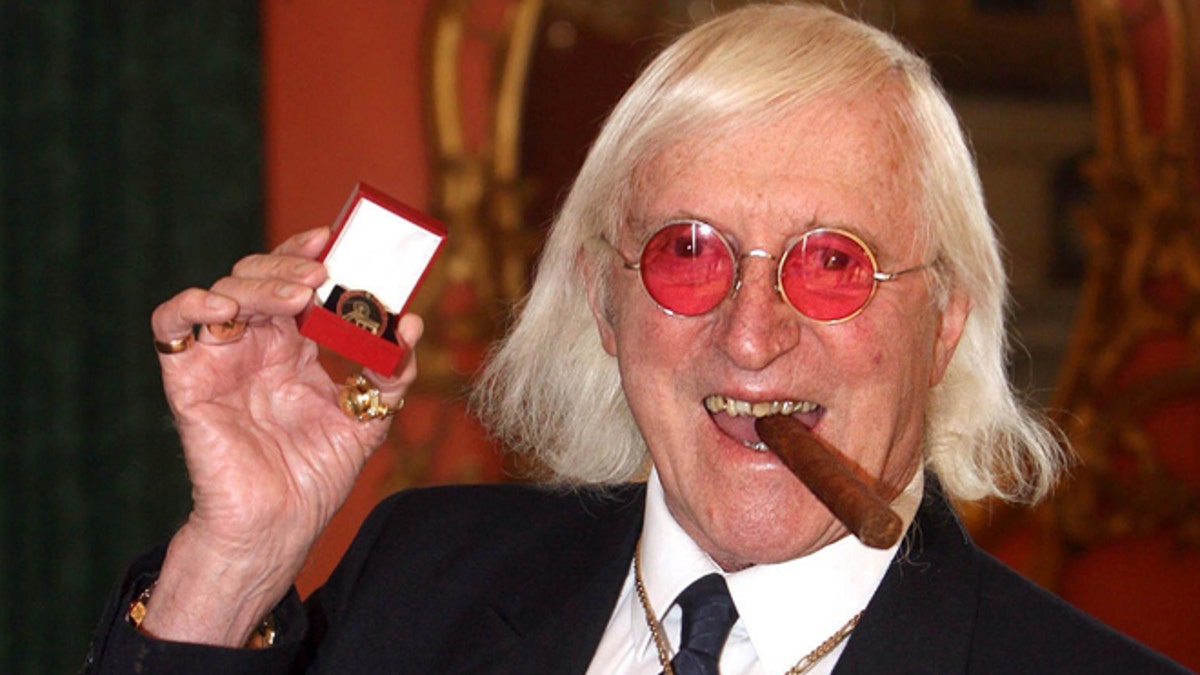
The BBC's problems first surfaced when it was learned that popular presenter Jimmy Savile was a serial pedophile. (AP/PA)
LONDON – The chairman of the BBC Trust admitted Tuesday that “shoddy journalism” was to blame for the British broadcaster’s recent woes, amid a damaging pedophilia scandal that has rocked the organization.
Chris Patten, the former governor of Hong Kong who now leads the body that oversees the BBC, admitted to the low journalistic standards at the corporation while being questioned by British lawmakers about a series of missteps at the BBC. The company's acting director general, Tim Davie, also appeared before the Culture, Media and Sports Select Committee, and denied that the BBC was “falling apart internally,” but admitted that morale had taken “a real knock.”
"There are morale issues frankly about whether managers are on their game,” Davie said.
The BBC has been thrown into crisis by botched reporting on two stories related to child abuse. First, it chose not to broadcast allegations – widely acknowledged as accurate – that the deceased former BBC TV and radio star Jimmy Savile was a predatory pedophile.
[pullquote]
The same program, the BBC’s flagship evening current affairs show "Newsnight," then incorrectly linked Lord McAlpine, a former treasurer of the Conservative Party, with a sexual abuse scandal at a children’s home in Wrexham, north Wales, in the 1980s.
While McAlpine was not named, the blanks were quickly filled in online and on social media, prompting the former adviser to Prime Minister Margaret Thatcher to publicly deny the allegations.
The program was forced to apologize for the report, after it emerged that McAlpine was wrongly identified and was not contacted prior to the report's airing.
The BBC said it would pay McAlpine $293,000 plus legal costs in a settlement.
Lord Patten denied interference in the decision to pull the initial expose into Savile, once one of the biggest stars on British television, and a high profile fundraiser. Shortly after the "Newsnight" report was pulled, the BBC aired Christmas tribute shows about Savile.
An expose of Savile was later broadcast by another network, prompting a wave of other victims to come forward and highlighting a culture of sexual exploitation by some stars at the BBC, particularly during the 1970s.
So far four people have been arrested in connection with the Savile abuse, including well-known personalities from the British entertainment industry.
Weeks later, "Newsnight" compounded the error by incorrectly linking McAlpine to child abuse. The report caused a national furor, with Prime Minister David Cameron at one point even being ambushed with a list of suspected pedophile politicians live on TV.
Davie was drafted in as interim leader of the organization after the resignation of George Entwistle after less than eight weeks in the job. Entwistle replaced Mark Thompson, now chief executive of The New York Times Company, who flew back to London over the weekend to give evidence to a BBC internal investigation into the Savile abuse.
Patten has come under heavy pressure for agreeing to pay Entwistle an entire year’s salary despite him lasting just two months in the BBC’s top job. But he claimed that Entwistle could have been in for an even bigger payday if the process had gone through an employment tribunal.
“The idea that I didn't understand how politically difficult it would be suggests political innocence which does not exist," Patten said.
Entwistle stood down after a series of disastrous interviews in which he appeared to lack control over the vast organization.
Patten last week announced that Tony Hall, a long-time BBC insider and current chief executive of the Royal Opera House, will take over as director-general in March next year.
The BBC is funded by the “license fee,” essentially a tax on households that own televisions.
